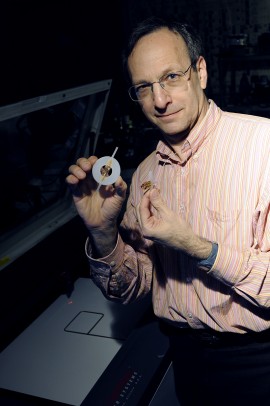Innovator of the Year’s work a cool development

“Almost half the energy we use is lost through poor insulation,” says Innovator of the Year Alan Feinerman. Photo: Kathryn Marchetti
The Innovator of the Year Award, presented by the Office of Technology Management, recognizes UIC researchers for innovative spirit and their invention’s potential impact to society. The award includes a $3,500 prize.
Alan Feinerman’s experiment with empty yogurt containers led to a start-up company, two patents, two Small Business Innovative Research awards from the National Science Foundation and two UIC prizes for innovation.
“It’s been a learning experience,” said Feinerman, who adds the Innovator of the Year Award to his 2011 Inventor of the Year honors, both from UIC’s Office of Technology Management.
Feinerman, associate professor of electrical and computer engineering, developed an insulation that is light, thin and inexpensive, produced by his company, Thermal Conservation Technologies.
“Almost half the energy we use is lost through poor insulation,” he explained. “We’ve been trying to commercialize an advanced thermal insulation for a variety of uses, including refrigerated transportation.”
Feinerman’s company produces a thin vacuum insulation panel made with inexpensive tensile supports and a stainless steel, puncture-resistant exterior.
Feinerman knew that vacuum would make a good insulator. “We all know it in the form of a cylinder we call a thermos,” he said.
Vacuum insulator panels made with the same metalized plastic film found in a thermos have been around a long time, but Feinerman said the product is inefficient and expensive. “I thought, ‘I can do better,’” he said.
The problem for vacuum insulation is withstanding atmospheric pressure, 15 pounds per square inch or 2,000 pounds per square foot. “That means if you have a one-foot panel, you have a Mini Cooper trying to crush it,” he said.
“I wanted a material that would be light weight and non-conductive, and plastic seemed perfect,” he said.
He started by putting three yogurt cups on his basement floor, then placing a 250-pound weight on top. After documenting the resulting crash — and reassuring his wife that he was OK — Feinerman got to work on a tensile structure that doesn’t buckle because the materials are under tension.
This elegant structure, which looks like a suspension bridge, is “better and cheaper.” It is the basis of his patents, Feinerman said.
The Thermal Conservation Technologies team includes the firm’s president, Prateek Gupta, a 2008 Ph.D. graduate in materials engineering who also has an MBA from University of Chicago, and scientist Michael Walsh, an engineering Ph.D. from Northwestern University who was a postdoctoral fellow at National Institute of Standards and Technology.
Feinerman majored in applied physics in college, but when he found his first job at Polaroid boring, he decided to return to school. He was lucky to find a mentor “who was interested in using physics to solve problems, which is exactly what I wanted to do,” he said.
“I’ve always just liked science and if something bothers me, I start thinking, ‘Is there a better way?’ It’s a curse I was born with.”
